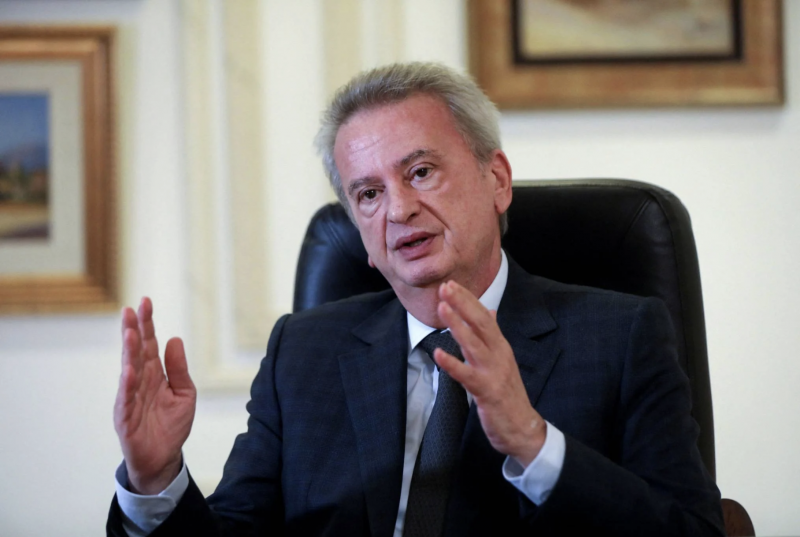
Banque du Liban governor Riad Salameh in Beirut on Nov. 23, 2021 in Beirut. (Credit: Mohamed Azakir/Reuters)
European judges are slated to arrive in Beirut next week to investigate financial malpractice involving Banque du Liban (BDL) governor Riad Salameh. The scheduled visit is sparking controversy among local judicial circles.
While some pundits consider the investigation to be legal in the sense that it falls within the framework of the United Nations Convention against Corruption — which Lebanon joined in 2009 — others deem it an encroachment on Lebanese sovereignty.
The visit was announced by AFP last week via a judicial official who said delegations composed of prosecutors, investigating judges, and financial prosecutors from France, Germany, and Luxembourg, are scheduled to land in Beirut between Jan. 9 and 20, to investigate embezzlement, illicit enrichment, and money laundering claims.
According to the same official, the competent authorities of the three countries have informed Lebanon's chief prosecutor, Ghassan Oueidate, that the investigations will concern BDL officials and bank managers, in addition to Salameh.
A source close to Oueidat's office, who wished to remain anonymous, told L'Orient-Le Jour that the European magistrates' initiative is in line with the mutual legal assistance decreed by the UN Convention.
The convention stipulates that a signatory state may request mutual assistance from another signatory state in order to “take testimony or statements” or “obtain originals or certified copies of relevant documents and records, including administrative, banking, financial, commercial, and corporate records.”
No article in the convention provides for authorization from the requested state — Lebanon, in this case — according to the source, who stressed that the convention is binding and must be accepted “as is” unless there is “a political decision is passed to prevent European prosecution.”
Is Lebanon's judicial system 'humiliated?'
According to a senior Lebanese judge who requested anonymity, the mutual legal assistance should be rejected because it undermines Lebanese sovereignty.
While this judge is known not to be close to Salameh, he fears a dangerous precedent could take place in a country marred by [foreign] interference.
“Foreign judges cannot exercise public power in Lebanon,” the judge said. “They can ask Lebanese judges to take necessary measures [ie interrogations, seizures, among other procedures] in the framework of cases that interest them,” he added. “Even if we are convinced that Riad Salameh is involved in financial issues, the fact remains that no foreign justice should independently investigate a Lebanese official on Lebanese soil.”
“Otherwise, this would be a humiliation and a mockery of the justice system in Lebanon,” the judge insisted, warning against “a dangerous precedent” that could allow other states to investigate cases in Lebanon that concern them.
“We do not want to cry foul should Syria or Iran do the same by delegating their judges to Lebanon,” the judge added.
Paul Morcos, a lawyer and founder of Beirut-based law firm Justicia, seemed to concur. According to him, the UN Convention against corruption prohibits any foreign party from overstepping the judicial sovereignty of local courts.
“If a state wants to carry out an investigation within the framework of Lebanese sovereignty, it should make the request through a rogatory commission addressed to the Lebanese judiciary, which alone has the power to conduct interrogations,” Morcos told L'Orient-Le Jour.
“These interrogations must take place in the presence of the magistrates of the requesting country,” he added.
Morcos also mentioned that specific problems could arise in this case, including the location of the interrogations and those who could attend.
“It is also a question of whether arrests can be made and, if this is the case, where will be the detainees held?” he added.
The answers to these questions remain unclear for the moment.
“The Europeans are very respectful of the procedure to be followed with regard to international regulations,” a member of the European Observatory for the Integrity of Lebanon, an NGO advocating for transparency and justice in Lebanon, told L'Orient-Le Jour on condition of anonymity.
“Any person who is summoned and does not appear [before the court], could suffer negative consequences, and they could be indicted,” the source added.
Justice blocked by politics
Others see the European initiative as an opportunity not to be missed.
“It is our right to demand and restore justice, even if this will have to be done through European justice,” Ghada Aoun, the General Prosecutor at the Mount Lebanon Court of Appeal, said in a Monday tweet.
Aoun initiated proceedings against Salameh in June but has yet to pursue the investigation of the case.
Similarly, Jean Tannous, the Attorney General at the Financial Prosecution, opened a case into the Forry Associates Ltd. — a company whose financial beneficiary is Raja Salameh, Riad Salameh's brother — which allegedly received over $330 million in brokerage fees between 2002 and 2014.
The proceedings came to a halt when the case reached the investigative judge.
“The laundered money also concerns European states. It is their right to investigate ... especially since the Lebanese courts do not send letters rogatory (formal requests from a court to a foreign court for some type of judicial assistance; editor's note),” Aoun said in her tweet.
Nizar Saghieh, the founder of local NGO Legal Agenda, believes the European initiative offers “hope” to find justice amid the judicial impasse at home.
“The Lebanese state has not constituted itself as a civil party to protect its rights relating to ill-gotten gains abroad,” Saghieh added. This, he warned, “will prevent the restitution of such assets, which will then be attributed to the states in which they are located.
“The political will to prevent justice from being served is an encroachment on sovereignty,” he said.
“Denouncing the European investigation under these conditions and in the absence of any national alternative would be to deny the Lebanese people the right to justice.”
This article was originally published in French in L'Orient-Le Jour. Translation by Sahar Ghoussoub.
